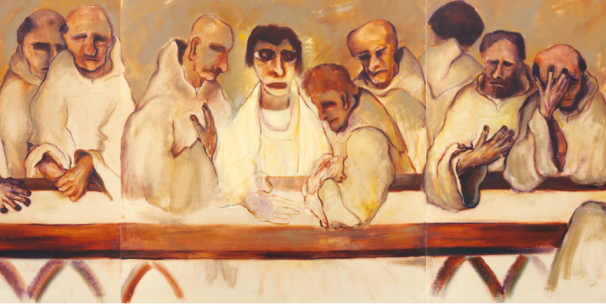
Fr Bob Eccles reflects on hungering and thirsting for Christ at such a different feast of the Body and Blood of Christ (Corpus Christi).
A picture can sometimes tell what words cannot. The Belgian artist Armand Demeulemeester (1926-2002) painted het laatste Avondmaal, the Last Supper, for the Trappists of Westvleteren Abbey in Flanders. Only the monks see it usually, for it is in their cloister, but anyone can find the picture easily on the net. I would like to tell you about this painting. He has done the apostles as monks, wearing white cowls and grouped closely around the table. They look as though they are used to eating together, they obviously belong, as monks should in their refectory. Only Christ is out of place, he sits there staring straight ahead, all by himself at the centre of events. There he is, staring into the future, a desperately tired and haggard young man, and very much alone now. Some of the fellows have begun to withdraw, they turn their backs. They have been following him for three years but they are sorrowfully disenchanted and discouraged by now. The dark night of despair is falling. Judas is leaving already.
There is something the matter with the picture. You get a shock. The knobbly carpenter’s hands aren’t holding anything, not anything at all. Where is the food, where is the cup and the dish? There is no Passover supper, nothing at all on the table but the two hands and the bare white cloth. This is all wrong. It’s disturbing. You suddenly take the point. It is this wretched victim who is the offering and the meal. This is the body that will be given for you – for us. The elements of the Eucharist are not lacking, but only the priest who is the lamb of sacrifice is visible. If the Lord is doing anything or seeing anything in this moment, there is nothing in front of him as he looks out, there is only us. The picture seems to say, Christ is there: are you there, o disciple? Your hunger is lacking, your thirst is lacking, because on this night of lies and betrayal, your faith is lacking too.
The picture in that Flemish cloister is one of a set based on the Stations of the Cross. They look as though they belong to a war zone, as of course they do. The Christ reminds us of the defeated prisoners of a war and the wounded soldiers, we see nothing beautiful in him, nothing to attract us. He is the paining, suffering servant of Isaiah the prophet.
The picture tells me two things about Holy Communion, two truths. To understand what happens now at this altar here I have to look beyond the signs and symbols of the bread and wine in their gold and silver gear. I have to look to one like me who suffered much more than I ever have of course, yet if you live eighty years you do know just a little suffering, some bereavement, pain and loss, so this young man is no stranger. I have to look past the signs of bread and wine into that well of human suffering, which my Saviour, friend and brother knew and shared with me. There is no other place to look for help or to find healing. Let me look past the elements, let me see my dear Lord who loved me and gave himself for me. Let me know nothing here but Jesus Christ and him crucified.
The other truth I can be sure of is, that my suffering, risen and ascended Lord is looking for my faith, that is to say, my appetite and my hunger and thirst, not only for the symbol – for many reasons I might be prevented from approaching the altar at Communion time – but for the one who by that symbol is fully present and signified, who is the bread of eternal life and the fruit of the true vine. He has come today looking for my thirst and my hunger, so that he may satisfy me. St John says that on the Cross, he cried out “I thirst” so as to fulfil the Scripture. Well, there’s nowhere in the Bible where God says “I thirst”, and yet through all the Scriptures we see God searching for us, wanting to know us, revealing his face to us. He always was thirsting for us. There is no obvious sense in what we have and are and can be for others, could be necessary or important to the Creator and Redeemer, yet it is so. You can never understand the Blessed Sacrament otherwise. It shows the hunger and thirst in Christ for the gifts that you are given, your faith, your hope, your love.
